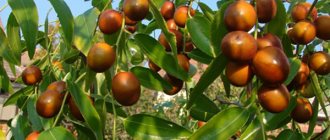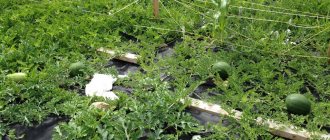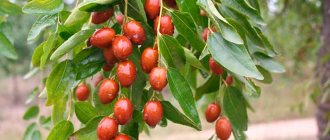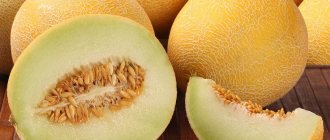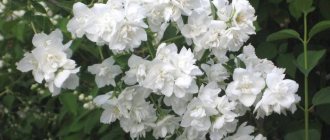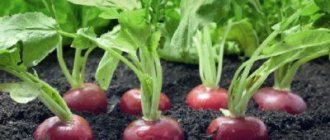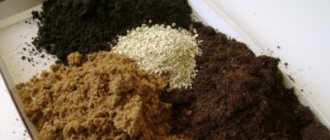Unabi is just one of the transcriptions of the name of this perennial heat-loving plant that came to us from Asia, in particular from the northern provinces of China. You may also hear this fruit called jujube, jujube, or jujube. Mongolia, Iran, Afghanistan, Tajikistan, Uzbekistan - these eastern lands have become home to wild species of the Chinese date. And selected species can be found not only in hot India, but also in warm regions of the Russian Federation, for example, in the Krasnodar Territory or the North Caucasus. Why this date is interesting - read about it in our article.
What does the Chinese unabi date look like?
- Unabi belongs to the evergreen shrubs of the deciduous . Its average height is about 5 m, the bark on the trunk is wrinkled and dark gray in color. Young shoots are often covered with hard thorns, but they fall off over time, and cultivated varieties do not have thorns at all.
- The tree has a spreading, but at the same time quite sparse crown, which does not provide dense shade. The plant is quite resistant to possible droughts, since it has an extensive root system that goes into the deep layers of the soil.
- Dark green leaves with veins have pointed tips , their shape is round or oval, size 3-5 cm. The leaves are alternately arranged, attached with short petioles. They open at the very end of spring, and at the beginning of June they begin to bloom with small light green or white flowers with 5 petals, similar to stars. The time of fruit appearance is the first half of autumn.
- The fruits of the Chinese date Unabi themselves belong to drupes and are similar to dates in cultivated species; the fruits of wild varieties are more similar to olives, since they are much smaller. A mature jujube fruit has a brown or reddish skin and light flesh, the structure of which is fine-grained. In the middle of this juicy pulp there is a thickened bone. The taste of the fruit is sweet and sour.
Unabi
Unabi (jujube): features, application
Unabi belongs to the buckthorn plant family. Most often, this plant can be found in warm climate zones. Unabi is widespread throughout Europe, Asia and even Australia. During the fruiting period, the plant produces small round-shaped fruits with a brown, smooth, glossy skin and juicy, sweet, very pleasant-tasting pulp.
Attention! You should be extremely careful with the leaves of the plant, since they have a slight anesthetic effect: even if you chew one leaf, there will be a slight paralyzing effect in the form of a temporary blocking of certain taste buds (sweetness and bitterness).
It is worth noting that fully ripened unabi fruits are quite fragile: with the slightest pressure they can simply burst and after that they lose most of their beneficial properties. True, recently gardeners have become adept at growing unabi in this way in order to keep its fruits intact.
Unabi tree
Unabi fruits are widely used not only in cooking, but also in folk medicine, and not only the fruits, but also the roots, leaves and even seeds can be used beneficially.
Popular varieties of Chinese date unabi
There are many varieties of jujube, about 50, but the most common are 3 main ones:
- Unabi Chinese (ordinary), the appearance of which is described above;
- A lotus tree that came to us from the Mediterranean subtropics has yellow fruits whose weight reaches 40 g;
- Unabi Moorish with round reddish fruits.
There is a more detailed division of the Chinese Unabi date into varieties within the main ones, which differ in the time of fruit ripening, their size, etc.
Of these, the following are relevant for the middle zone:
- Chinese 60 – small, up to 3 m, with fruits about 10 cm in size, harvesting in September.
- Sinit is a medium-tall plant with small fruits (about 6 cm).
- Date has fruits of about 4 cm, which fall off quickly when ripe, so the harvest should be harvested immediately.
- Mori jer - with large, up to 25 cm fruits, frost-resistant.
- Khurman - covered with thorns, fruiting lasts up to 3 weeks, has sweet fruits.
- Candy - quite low, has a spherical crown, bears fruit in the fall. The fruits are sweet and red.
- Southerner has pear-shaped fruits, which are used primarily for preservation.
- Shirvan is a mid-season variety, the fruits are sour.
- Tavrika - fruit ripening occurs in November.
- The firstborn produces a high yield of sweet and sour fruits, barrel-shaped, with a sweet and sour taste.
- Ya-Zao is an unpretentious medium-ripening variety.
- Absheronskiy - is frost-resistant, has a sweetish fruit with a slight sourness.
- Kara-Dag is a late-ripening variety
- Koktebel - large fruits also ripen late, and the yield from one tree can be about 80 kg.
Candied plums
- plums 1 kg;
- sugar 200 g;
- ground ginger 2 teaspoons.
- Wash the plums and cut them in half.
- Mix sugar with ground ginger.
- Place the plums on a baking sheet and sprinkle with ginger sugar. Place in the oven at 200 degrees with top airflow for 20 minutes.
- Drain the juice from the plums. Lay out the plums and dry until you get candied fruit.
I advise you to try smoking candied plums. The result is an extraordinary dish that will definitely win over your loved ones. All you need is a smoke generator and, if necessary, a smoking cabinet.
Composition and calorie content of the fruits of the Chinese date unabi
- The fruits of the Chinese unabi date contain a lot of amino acids, vegetable fats, and sugars. In particular, the pulp contains citric, malonic, malic, folic, tartaric and other organic acids; ascorbic, nicotinic acids; flavonoids; vitamins of groups A, B, P and E; alkaloids; minerals: potassium, copper, sodium, magnesium, iron, calcium, zinc, phosphorus, iodine, manganese; steroid compounds; carotene; triterpene glycosides; saponins; fixed oils.
- The roots and bark of jujube contain tannins, alkaloids, and coumarins.
- 100 g of product contains 1.2 g of proteins, 20.23 g of carbohydrates, 0.2 g of fat. The caloric content of a fresh fruit is about 80 kcal per 100 g of product, which is twice as high as, for example, pears or apples, and corresponds to the caloric content of grapes or bananas. In the form of dried fruits, unabi has a calorie content of about 350 kcal per 100 g.
Useful fruits
Recipe for candied pumpkin
- 1.2 kg pumpkin;
- 600 g sugar;
- 1 lemon;
- 1 orange;
- 150 ml water;
- spices (cinnamon, cloves).
- Cut the peeled pumpkin into equal cubes 1-2 cm thick.
- Add sugar, squeeze out orange and lemon juice. Leave the juice overnight.
- Add 150 ml of water to the pumpkin with syrup and citrus fruits, add spices.
- Boil for 5 minutes. Let cool. Boil again and cool 4 times. The pumpkin should not be boiled, the cubes will be dense.
- Dry in the oven or dryer until ready. I speak from experience, it may not work out in the oven the first time, as the temperature can fluctuate. And professional dryers provide temperatures for the type of product and their maintenance.
- Roll in a mixture of powdered sugar and starch.
The healing properties of the Chinese date unabi
- Jujube fruits have several effects at once: anti-inflammatory, antioxidant, expectorant (the leaves of the plant have this effect), hypotensive. Moderate consumption of this product, both fresh and dried, can alleviate the condition of intoxication of the body, fever, nervous and physical exhaustion.
- The fruits of the Chinese date unabi help with headaches, are good for activating intestinal function and motility, normalizing fat and carbon metabolism, and strengthening the immune system. The date is also useful for pregnant women, as it helps with toxicosis, and its pulp is often recommended for nursing mothers as a factor that promotes the production of more breast milk.
- If we talk about leaves, bark, and seeds, they also have beneficial properties; they have been used in Chinese medicine for a long time. They are used to normalize the condition of nervous disorders, sleep disorders, symptoms of headaches and toothaches. The raw materials of the Chinese date unabi are also used to treat problems associated with dermatology , stomatitis , and inflammation of the genitourinary system. Jujube is an excellent diuretic; in addition, ripe dates are usually recommended for constipation, while unripe dates, on the contrary, will help with diarrhea.
- The Chinese unabi date is also able to alleviate severe urological problems, for example, helping to reduce swelling, fight inflammation, and inhibit the possibility of infection. The vitamins contained in the composition transform unabi into a kind of immunostimulant that supports the body during flu, respiratory and other seasonal diseases and vitamin deficiency. For hypertensive patients, doctors can recommend up to 20 fruits in the daily diet (of course, in the absence of contraindications). An additional effect of this “course of treatment” may be an increase in the amount of hemoglobin in the blood, which is important for anemia.
- Minerals and trace elements , contained in large quantities in the Chinese unabi date, have a highly digestible form, due to which they support the health of the musculoskeletal system, bones, and are a natural prevention of osteoporosis. By the way, pharmacologists also “adopted” jujube, using it in the industrial production of dietary supplements.
Benefits and harms
Jujube is a valuable berry that contains a lot of useful nutrients and is a leader in the amount of vitamin C and iodine.
Attention! During storage, the amount of ascorbic acid in jujube fruits increases. Dried berries retain vitamins for 2 years.
Jujube berries are a unique dietary and medicinal product; their properties are almost as good as eleutherococcus and ginseng. Its use has:
- restorative effect on the body, strengthening immune mechanisms, eliminating vitamin deficiency and anemia;
- cleansing and diuretic effect, eliminating swelling and toxins, blood vessels from cholesterol plaques;
- corrective effect on the functioning of the digestive system, activating the functions of the liver, intestines, and gall bladder;
- hypotensive and vasoconstrictor effect, reducing blood pressure;
Dried berries contain more ascorbic acid than fresh ones - sedative effect, relieving insomnia and neuroses, anxiety and depression;
- tonic effect during mental stress;
- softening effect on coughs and throat diseases.
Attention! In China, the fruits, seeds, roots and leaves of unabi are used to make dietary supplements.
In addition, the inclusion of unabi in the diet helps improve vision and weight loss, and in lactating women, increases lactation. Eating a few jujube fruits can easily get rid of a hangover.
Due to its anti-inflammatory and analgesic effect, decoctions and infusions of jujube leaves are used in the treatment of diseases of the gums and throat, purulent wounds, burns and dermatitis.
Unabi berries have anti-inflammatory properties
Contraindications to the use of jujube are individual intolerance to the product, the presence of hypotension. It should be used with caution during pregnancy.
Useful cosmetological properties of the Chinese date unabi
- The beneficial qualities of the Chinese unabi date are especially known for solving problems with the condition of hair and skin. In particular, due to the high content of vitamins and biologically active components, the Chinese date helps in case of seborrhea, with the development of complete or partial alopecia, prevents possible blockage of the sebaceous glands, and improves blood flow to the hair follicles. The bark of the Chinese date and the infusions made from it are especially useful in this regard.
- Acne and skin rashes, oily skin, pimples, age spots, wrinkles - unabi successfully fights these problems, since the skin of its fruit has an antibacterial and antioxidant effect and is included in some face masks with a rejuvenating effect. Cosmetologists believe that the most noticeable effect of skin rejuvenation is with the regular use of Chinese dates, both as part of face masks and in their natural form.
Jujube fruits are used in cosmetology
Jujube in cosmetology
Mask for rejuvenation: grind 100 g of fresh jujube pulp, add sour cream (20 g), honey (1 teaspoon). Keep on face for 20 minutes, then rinse. Apply the mask in the evenings 3 times a week for a month. The effect is that the skin is cleansed and wrinkles are smoothed out.
Ointment for acne, inflammation: chop 3 tablespoons of fresh leaves, pour in 3 tablespoons. olive oil, place in a water bath and bring to a boil. Cool and leave for 10 days. Store the ointment in a cool place and use it within 10 days.
Decoction of leaves for acne: brew dry leaves in the usual way (1 tbsp per glass of water), leave for half an hour, strain. Store in the refrigerator, wipe the skin instead of lotion in the morning and evening for 10-14 days.
Decoction of roots for hair growth in adults and children: add water (500 ml) to the crushed roots (20g), place in a water bath and cook, stirring, for 30 minutes. Add water to the cooled and filtered broth to 500 ml. Rub into scalp after washing every day before bed for 30 days.
Dried leaf rinse: 5 tbsp. l. Brew 1 liter of boiling water, leave for 60 minutes, filter. Rinse clean hair with the decoction every other day for 1 month, allowing it to dry on your head.
Oil for hair growth and strengthening: mix equal amounts of jujube, rosemary, mint, olive oil, add a few drops of vitamin E. Apply to hair and scalp 2 hours before washing, use for 21 days.
Contraindications to the use of Chinese date unabi
- The average consumption rate of jujube is about 10 fruits per day , which provide the daily requirement of nutrients and minerals. A larger amount may pass without a trace for some, but for others, especially if tolerance is impaired, it can cause intestinal upset. Also, unabi can have a harmful effect in case of hypotonic conditions and in some diseases of the gastrointestinal tract: increased acidity of gastric juice, cholelithiasis, pancreatitis, etc.
- Another risk of excessive consumption of unabi is that it is a potential allergen, so you should get acquainted with these fruits carefully, starting with a couple of pieces a day and carefully monitoring the body’s reaction.
- Jujube is not recommended for those who have peptic ulcers and low blood pressure, as it helps lower it. An overdose can lead to hypervitaminosis and an allergic reaction in the form of a rash. Some people have experienced disorders in the gastrointestinal tract (especially if the fruit is not peeled), and a small number of people have a natural intolerance to jujube.
- It is better not to give Unabi to small children until they reach 5 years of age, and after that - in small quantities. Pregnant women and those with diabetes should consume the fruit and medications containing jujube seeds with caution and only with the permission of a doctor. Strict dosage is necessary for those who want to lose weight, since unabi contains a lot of sugar.
Description
Jujube, also known as unabi, or Chinese date, is a very unusual plant.
It is rich in useful substances and will delight everyone who tastes its fruits with its unusual taste and pleasant aroma. It is worth learning more about the exotic plant and its berries. Jujube is a plant from the buckthorn family. Externally it is a shrub or a small tree. Its bark is thick and dense. It grows mainly in Asia, as well as Australia, but it can easily be grown in European climates. The plant prefers sunny slopes of mountains and hills.
Planting Chinese date unabi in the middle zone
- It is quite possible to grow jujube in the middle zone. To do this, you just need to choose the right variety, familiarize yourself with the features of planting and caring for it.
- As a rule, shrubs or low grafted varieties with a spreading crown take root best in these latitudes. They bloom quite late, around mid-June, which eliminates the possibility of frosting of the buds and ovaries, since the frosts have ended - this way the plant gets the opportunity to fully pollinate and bear fruit.
- The Chinese unabi date is cross-pollinated, the color lasts up to 2 months, during which the bulk of the flowers are concentrated on the old side shoots, a few flowers are formed on new shoots. The plant bears fruit in September-October , fruiting lasts up to a month. Tolerates frosts well (down to -30°C), and is able to recover from freezing with subsequent fruiting.
- Based on these characteristics, for the middle zone you should select such varieties of Chinese date unabi as “Chinese 60” and “Chinese 93”, “Burnim”, “Sochi 1” and “Temryuksky 1” , as well as “Date” and “Druzhba” . The plant grown from seed will be the most adapted to local weather conditions.
Cooking steps
Prepare syrup. To do this, heat water with sugar and citric acid to a boil, cook over low heat, stirring until all the sugar has dissolved, remove from heat. Pour jujube berries into hot syrup and leave for 12 hours (overnight).
Then put on medium heat and cook for 25-30 minutes, stirring occasionally. It is advisable to remove the foam from the jam.
Place the hot jujube jam into sterilized jars, screw on the boiled lids, cool and store in a cool place.
Bon appetit, make your loved ones happy!
Contents of the article: Jujube are the berries of the plant of the same name in the genus Jujube, family of the Jujube family. They have many names - chamois, Chinese jujube or date, unabi, jojoba (jujub), bodari... The variety of names is evidence of how popular the plant, the first mention of which was found in the chronicles of the ancient holy Hindu city of Badrinath, is among different nations. The peoples of China have been cultivating thorny shrubs for 4,000 years; they are widespread throughout Southeast and Central Asia, throughout the Mediterranean, and are found in the Caucasus, Australia and Japan. The height of the plant can reach 8 m, the shoots are equipped with sharp thorns, the leaves are narrow, dense, glossy. The fruits are small drupes, first yellow, then red-brown. The skin-shell is elastic and smooth, the flesh is fleshy and very sweet. The main name “jujube” is literally translated as “edible fruit,” which indicates the value of the culture.
How to plant Chinese date unabi in the middle zone?
- When choosing a place to plant the Chinese unabi date, you should pay attention to its openness to the sun and lack of shade. The area should not be blown by winds; drafts are also undesirable for jujube. The soil for planting can be any, with the exception of clay or too salty.
- Planting is usually carried out towards the end of spring. If you plant a Chinese date in the autumn, there is a risk that it will not have time to take root and the young plant will suffer from frost. Plant the seeds in the soil to a depth of 4 cm.
- The planting site should be watered and covered with film, under which seedlings will be visible after a month and a half. There should be a space of at least 25 cm between individual specimens, so if necessary, the sprouts should be thinned out. Before winter, the trunks of the seedlings are hilled up, and after a year they can be transplanted to the chosen location.
It is important to choose the right place
- To plant a seedling, you need to prepare a hole measuring 1 m by 1 m and add fertilizers to it (both mineral and organic). A seedling is planted in a prepared and fertilized hole, the roots of which must be straightened and covered with soil . Then you need to compact the soil around the planted plant and mulch it. When preparing the holes, you need to make sure that there is at least 3-4 m between them, since the crown of the Chinese date grows quite strongly. You should not expect the growing season to begin in the spring - for jujube it begins later.
a brief description of
The Chinese date is grown in different countries of the world because its fruits are very tasty and nutritious. There are about 400 varieties of jujube.
How does it grow and bloom?
The Chinese date is a low deciduous tree or shrub with thorns. The height of the tree is usually about 5 meters. The crown of a tree or bush is small, most often in the shape of a pyramid.
The leaves of jujube are simple, with entire edges. The plant blooms with small flowers, white-green in color. The flowering period of unabi occurs in early summer, and the plant produces fruits in early or mid-autumn.
What do the fruits look like?
The fruits of jujube are drupes. © https://ydoo.info/product/zizifus.htmlGrows in the form of a ball or ellipse. They are smooth, brown with a red tint. The weight of the fruit is usually up to 50 grams including the seed.
Jujube taste
Jujube is a very pleasant and unusual tasting plant. Tender flesh is hidden under the hard and smooth skin. The fruit is quite juicy. Its taste is most similar to the usual date, but less cloying and more delicate.
How they eat?
Jujube is used for food in various forms. The healthiest thing is to eat it fresh, like any berry.
To preserve for the winter, Chinese dates are smoked, dried, dried, canned, and less often frozen.
In fresh or dry form, unabi is added to baked goods or salads, used to make healthy sweets without sugar and chocolate, and also added to fruit purees for children so as not to use additional sugar.
How to water and fertilize the Chinese unabi date in the middle zone?
- Excessive watering will be disastrous for the Chinese unabi date , since this crop is drought-resistant and does not tolerate excessive moisture. Watering 3-4 times over the entire dry season is considered sufficient, and if precipitation occurs regularly or excessively, the number of waterings should be reduced. The date does not need watering during fruit formation.
- But for better rooting of the seedling, it should still be watered more often. Watering should be stopped before the beginning of the autumn period - this way the fruit will not crack and the shoots will be able to ripen completely. After each watering, do not forget to loosen and mulch the soil around the trunk, not reaching about 10 cm. During loosening, this work should be especially carefully carried out in the area of the roots - both superficial and deep.
- Twice during the season, unabi should be fed with organic matter and mineral fertilizers . Experts recommend fertilizing in the spring with nitrogen-containing compounds, which will stimulate date growth, and in the fall with phosphorus-potassium fertilizers, with the help of which jujube will successfully overwinter. As for the amount of fertilizer applied, it should be less for young plants than for adults.
How to prune the Chinese unabi date in the middle zone?
- The first pruning should be carried out already in the first year after planting - this is how the foundations are laid for the correct formation of the crown of the Chinese unabi date. Early pruning will help unabi to form first-order skeletal shoots before reaching the age of two. To do this, lay a trunk, cutting off the central conductor to a level of 80 cm, leaving the main shoots of the first order.
- The next year, they begin to form second-order shoots, leaving for this purpose 2-4 of the strongest side shoots, shortening them by 2-3 buds . From above, the branch is shortened by 2 internodes. Thus, correct pruning leads to the fact that from each of the shoots of the first order there are 2-4 shoots of the second.
- Pruning is also carried out according to the same scheme in the fourth year of development of the Chinese unabi date. In addition to forming the crown, it is necessary to thin out the shoots for better illumination of the entire plant, and also be sure to remove dried, cracked or broken branches, shoots that are intertwined.
How to select and store?
In order to get the maximum taste and benefit from the fruit, it is important to choose it correctly and also store it in suitable conditions. There are basic rules for choosing a Chinese date:
- When purchasing a whole fruit, you should pay attention to how smooth and beautiful it is. However, you should not take a date that is too shiny: it may be waxed.
- You should also look at the color of the peel. In a ripe fruit it is dark red or closer to brown.
- You should not pay special attention to the size of the fruit, since it depends on the variety and does not affect the taste and sweetness.
- When purchasing a packaged fruit, you should pay special attention to the place where the Chinese date was grown. It is better to give preference to fruits that are collected in areas located high above sea level. You can also safely take dates grown in mountainous areas.
- If the jujube fruit has a yellow side, you should be prepared for the fact that the berry may be a little sour, but sourness most often gives an interesting taste.
It is also important to store jujube correctly so that the fruit does not spoil and retains the maximum amount of benefits.
- Fresh fruit can be stored for up to two weeks at room temperature and up to a month in the refrigerator. But you should not put it in a department with high humidity.
- Sun-dried unabi is best stored. This way it remains tasty and healthy for up to a year. If you store dried fruits in a cabinet without access to moisture, at a stable room temperature and in a jar with a lid, you can keep jujube for more than a year.
- Unabi jam lasts the longest. However, if you cook the fruit and add sugar, the benefits will go away almost completely. But the taste will remain and become richer than that of fresh fruit.
How to harvest the Chinese date unabi in the middle zone?
- Jujube fruits ripen in autumn and the degree of full ripening is determined by the fact that the fruit is easily separated from the branch and can also be easily shaken off. Thus, the Chinese unabi date is harvested by hand, taking care not to damage the fruit. If full ripening does not occur before the onset of frost, as often happens in the middle zone, then the fruits of the Chinese date can be collected and laid out for ripening.
- After harvesting, young seedlings can be insulated by wrapping the trunk with film or using any other material and pre-hilling it. Thus, the unpretentious, frost-resistant, hardy unabi plant can be planted, grown and, most importantly, received a generous harvest in the middle zone without much difficulty.
What does jujube help with?
1. General strengthening effect
Fresh, dried or dried fruits are consumed 2 times a year for 2 months without a break. The optimal dose for a person weighing up to 70 kg is 50 g per day. This is 20 fruits. Take 10 pieces in the morning and evening, raw or in the form of compote. For people weighing more than 70 kg, the dose is increased at the rate of 50 mg per kilogram of weight.
2. Hypertension
In Russia, the plant is valued for its hypotensive effect.
To cure, jujube is taken systematically and regularly:
- decoction of dried Chinese dates: 100 ml 5 times a day, 1 month;
- infusion of leaves: 50 ml after meals 3 times a day;
- water infusion of fruits: 1 glass 3 times a day, 2 weeks;
Fresh berries (7-8 pieces) are eaten 3 times a day after meals, consumed for 2-3 weeks. Then they take a break and repeat the course. According to other recommendations, continuous use lasts 3 months. A persistent hypotensive effect, improved well-being, and lower cholesterol are noted.
3. Alcohol intoxication
The plant cleanses the blood, reduces intoxication, and protects the brain from the effects of ethanol. After libation, it is recommended to take a glass of compote or decoction of Chinese date fruits. For prevention, the compote is drunk before the feast.
4. Constipation
Pectin and fiber improve intestinal motility. The choleretic effect of the fruit promotes bowel movements. A clinical study confirmed the effectiveness of unabi decoction in 84% of study participants who suffered from constipation.
5. Diarrhea
Drink 500 ml of jujube root decoction per day in portions before meals, 1 hour before meals. The decoction is prepared daily in the morning.
6. Sleep disorders, depression, anxiety, restlessness
Chinese medicine recommends unabi preparations as a calming and treatment for insomnia. Jujube alkaloids are similar in action to Valium.
- Drink 1 tbsp of alcohol tincture 3 times a day for 7 days. After 4 weeks, the course is repeated.
- ½ tbsp. tea from the fruit, brewed in the usual way, is drunk before bed.
For depression and nervous tension, carry dried fruits with you and eat several pieces all day.
7. Colds, bronchitis
Infusion of leaves for cough: 50 ml 3 times a day. Take for a week.
Drink 0.5 liters of seedless dried jujube decoction per day for colds and coughs.
8. Skin diseases
Dermatitis, psoriasis, scars, scars, ulcers, abscesses. Fresh leaves are ground into a paste and applied to the wound, and an ointment is prepared from them. Compresses and lotions are made from a decoction of the bark;
9. Blepharitis
Eyes are washed with a decoction of the bark.
10. Anemia, vitamin deficiency, reduced immunity
Ascorbic acid and iron restore hematopoietic function and enrich the blood with oxygen. It is useful to eat fresh or dried fruits. Compote is prepared from the dry ones, which is drunk in a glass 3 times a day.
11. Excess weight
The fruits are low in calories, rich in nutrients and vitamins, and can replace sweets for those who cannot refuse them. Jujube compote is sweet even without added sugar. You can make delicious candies from the fruits: remove the seeds, grind in a blender, roll into balls, roll in coconut flakes.
12. Diabetes type 1 and 2
The fruits contain ceomertillin, a natural insulin. Clinical trials showed that after a week of eating a glass of fresh fruits a day, the sugar level of the expert group returned to normal. Doctors recommend consuming fresh fruits, since dried fruits have a higher sugar content, and the dose is halved - 150g of fresh or 80g of dried unabi per day, or in the form of a decoction. The dose cannot be exceeded.
13. Gastrointestinal diseases
Taking 15-20 fruits daily cleanses the digestive tract of toxins and reduces the risk of developing stomach ulcers.
14. Osteoporosis
For preventive and therapeutic purposes, jujube is consumed in an acceptable daily dosage for 2-3 months.
What to cook from Chinese date unabi?
- Since jujube is a perishable product, it must either be quickly eaten fresh or processed just as quickly. Usually, the fruits of the Chinese unabi date are dried, preserved, and made into compotes, juices, or sweet rolls . The dry pulp of jujube fruits can be added to baking - if you bake bread from such dough, it will not go stale longer than regular bread.
- Chinese dates are also popular as a snack - the dried fruits are served with tea or for dessert. By the way, tea can also be made from unabi by pouring boiling water over a dozen fruits and infusing them. You can sweeten this tea with honey if you wish. And the roots of the plant can be used to prepare a decoction: chop, pour boiling water and leave for about 30 minutes. Jujube can also be pickled, dried, dried...
Most often the fruit is dried.
Here are some recipes:
- Unabi jam. This recipe is similar to the famous strawberry jam, which is called “five-minute jam”. For 1 kg of Chinese date fruit, take 800 g of sugar and a liter of water. Boil syrup with sugar and water and pour it over the unabi fruits. Bring to a boil, simmer for 5 minutes and then leave to steep overnight. After this, chop the fruits, first removing the seeds from them, and boil again with constant stirring for 5 minutes. Now put the hot jam into sterilized jars and roll up.
- Drinks made from Chinese date fruits
- For jujube compote you will need: 0.9 kg of unabi, 3 liters of water, 2 tbsp. l. honey Place the fruits of the Chinese date into boiling water and boil for half an hour. Honey is added after the compote has cooled slightly.
- You can prepare another version of unabi compote by adding ginger and pear to it. For 450 g of unabi you will need a small piece of fresh ginger and one pear, you can also add a cinnamon stick. Cut the ginger and pear into pieces, and cut the dates in half, put everything in a saucepan, pour about 4 liters of water into it and, boiling, cook for 4 hours.
- Candied Chinese dates. For 1 kg of unabi you need to take 700 g of sugar, 650 ml of water and 5 g of citric acid. Make punctures in the dates with a fork, boil water with sugar and, putting jujube there, boil for half an hour. Leave everything overnight, and in the morning boil again and cook for half an hour, adding citric acid at the very end. Then cool, place the dates in a sieve and wait for the syrup to drain. After placing the fruits on foil, place them in the oven, preheating it to 130°C, for several hours. The process may take two hours, or maybe all of 5. By turning the dates over from time to time, you will see how the liquid leaves them. When about a quarter remains, the candied fruits can be considered ready.
- Jujube jam. For 800 g of dates you will need the same amount of sugar, about 400 ml of water and 10 g of citric acid. Prick the fruits with a fork, boil water and add citric acid and sugar. Let it cook for 2-3 minutes, then add jujube. Immediately turn off the heat and leave the pan overnight. In the morning, cook again for half an hour, then immediately roll up. You can optionally add cinnamon to the jam and replace some of the sugar with honey.
- Marinated unabi. You need to take 2 kg of green dates, 100 g of sugar, 200 g of salt, 200 ml of apple cider vinegar, 120 g of sunflower oil (preferably refined), 6 cloves of garlic, 10 bay leaves, 20 peppercorns, one and a half liters of water. Wash the unabi well and dry it. Place spices and garlic in sterilized jars, fill the containers with dates. Fill the jars with boiling water and drain after 10 minutes. While the jars are standing with water, you can make brine by boiling water with sugar and salt and boiling for a couple of minutes, then add vinegar. Pour the brine over the dates until they are covered and top up with sunflower oil. Roll up immediately. These unabis taste like olives.
- Canned Chinese date unabi. For 600 g of dates you will need 230 g of sugar, 70 g of salt, 170 ml of vinegar and 5-6 clove buds. Water calculation – 1 liter. Boil water with sugar and vinegar and pour this marinade over unabi placed in sterilized jars, adding a few cloves to each. Close immediately.
- Dried jujube. For 1 kg of jujube you will need a liter of water and 800 g of sugar. It is better to take dates that are slightly unripe. Prick each fruit and place in boiling syrup. Boil over low heat and cook for a couple of minutes. Leave overnight, then boil again for 5 minutes, again over low heat. Then repeat the whole process again. After this, remove the unabi, if there is any liquid left, let it drain and dry in the dryer at maximum temperature for 4 hours, then reduce the temperature and dry until ready.
We will also consider the following beneficial properties of the products:
- Goat milk
- Black elderberry
- Rose hip root
- Bear fat
- Cilantro
Some tips
The essence of preparing candied fruits is simple - the water contained in fruits and berries must be replaced with sugar, which is an excellent preservative. The most important thing in this matter is not to rush.
- To make candied fruits tasty and aromatic, carefully select the fruits for them. For cooking, you need fully ripe fresh fruits, without damage to the skin or dents.
- Before boiling in syrup, the fruit can be blanched by submerging it in boiling water for about 30 seconds. More fragile ones (like peaches) will only need 15 seconds. Blanching will allow the fruit to retain its color and will also partially break down the fibers, making them more permeable. This way they will cook faster.
- You can add spices to the sugar syrup to give the candied fruits a more piquant taste. Anise, cloves, cinnamon and cardamom are excellent.
I’ll tell you a few recipes and tips for preparing this sweetness - you’ll get aromatic and tasty slices!
